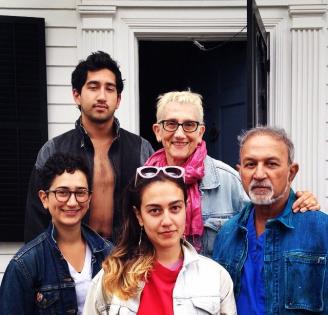Many of the people I interviewed expressed a common theme about such conversations: that when conversations about their ethnicity or identity did occur they did not happen on their own terms but rather in response to someone wanting to know their racial heritage and background—the “what are you?” moment that many narrators described. I like to think about the oral histories that I conducted for the Crossing Borders Bridging Generations project as the opposite of this “what are you?” moment. Instead oral histories are a space for people to describe their identity in relation to the stories and experiences that matter to them and that have shaped the way they understand themselves.
In her interview with me, Devika Wickremsinghe described being asked what she “is”:"
Yeah, people ask me what I am, and then I often get the strange response of, “What a beautiful mix,” or “That’s so interesting.” Like, some kind of qualitative response. Which makes me less uncomfortable than it used to, I guess, or ... I try not to let it bother me. But there’s also some guessing in terms in social situations where you’re approached, like, sexually by a stranger, or as a come-on...I just really loathe that as, some kind of way in, to be flirting with somebody, to be like, “Where are you from? What are you?” And it’s, well, it’s not that interesting to me, you know?"
In contrast to this uncomfortable moment she says this near the end of our interview together:
"I could talk like this for a long time. It’s very interesting to be prompted and asked things so specifically about this. I feel like this conversation doesn’t happen in my life in this pointed way...
This is the space that oral history creates: space for the complicated, messy stories, experiences, and histories that shape the way people think about themselves and their identity. It takes the “what are you?” moment and turns it around, it asks people openly how they identify and in what ways this identity has shifted and changed, been in process or developed over time. These are the “pointed conversations” that Devika references, that do not usually happen."
The conversation Devika and I had was expansive, covering her mother’s Italian heritage in Brooklyn, her recent trip to Sri Lanka with her family, growing up in Staten Island and being a part of the modern dance scene in New York City. We talked about gender and cultural norms, about being expected to know how to tie a sari but never having anyone teach either of us because our fathers never knew how, about language and legitimacy, history and violence, about being exoticized, and about feeling a sense of kinship with other people with families of mixed backgrounds, no matter what their backgrounds were. When, at some late point in the interview, I asked her how she identified she replied:
"It’s really hard for me to describe what I am, and I do think of myself as Sri Lankan and as Italian, but I mostly think of myself as some kind of other thing, like the slang with my sister, the people in my community being my siblings, you know, in this small racial community... I think we -- from talking about it on this trip especially, about not feeling enough of this or enough of that, it feels like we’re some kind of wild breed that just comes from my nuclear family, that just happens to be so small."


